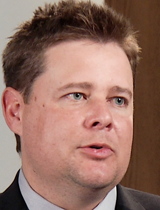Economists who advise the Arizona Legislature say the state's economy is getting brighter, but slowly, and they are sticking to their long-held forecasts for full recovery no sooner than 2015.
The Joint Legislative Budget Committee heard the reports Thursday at the state Capitol, including an admonition from one economist to legislators to stay conservative in budgeting because of uncertainty over fiscal issues in Washington.
 Jim Rounds, senior vice president and economist, Elliott D. Pollack & Co.
Jim Rounds, senior vice president and economist, Elliott D. Pollack & Co."The Legislature needs to be conservative, at least for the upcoming budget," said Jim Rounds, senior vice president and economist with Elliott D. Pollack & Co. of Scottsdale.
Rounds, who made the comment in an interview for Friday's Arizona Week broadcast, said he is shaving 1 percentage point off of his economic growth forecasts for the state because of the federal budget cuts known as sequestration.
"Instead of forecasting 5 percent, you come down to 4, instead of forecasting 6 percent, you come down to 5," Rounds said, because "there are so many unknowns."
He said the fact that Arizona has a growing population gives it a momentum that will make the overall impact of federal cuts less damaging statewide. Nevertheless, he said, he is worried about rural areas and some spots that are tied to the military and other defense spending.
Aruna Murthy, director of economic analysis for the state Office of Employment and Population Statistics, agreed. Murthy, in the same Arizona Week interview, said rural Arizona could have issues.
 Aruna Murthy, director of economic analysis, state Office of Employment and Population Statistics.
Aruna Murthy, director of economic analysis, state Office of Employment and Population Statistics."We certainly have to account for what the sequestration cuts are, especially with the defense industry in Arizona playing a predominant role," she said.
Murthy, who leads compilation and analysis of Arizona unemployment and job statistics, said she is preparing her annual job growth forecast for release May 9. She cited sequestration and the negative effects of the payroll tax increase that took effect in January as factors that could affect job growth.
Rounds previously predicted that the first half of 2013 would be slow for economic growth in the state, and the statistics so far match that. Unemployment was 7.9 percent in February, down from 8.0 percent in January, and state tax revenues are running ahead of last year, but the increases are small.
Rounds said this week that while businesses are beginning to invest and consumer spending is moving upward, both making 2013 potentially better than 2012, the going is still slow.
"I think our optimism has been tempered just a little bit, and a lot of that had to do with the uncertainty in Washington the last several months, causing some businesses to want to hold off on investments and consumers to hold off on spending," he said.
"But businesses are starting to invest a little bit more. You're going to see more of that in the summer and fall ... It isn't occurring as early as we anticipated."
Murthy said she is worried about job growth in the retail sector. While retail sales are climbing - state sales tax revenues were 4.1 percent ahead of last year through nine months of the fiscal year - employment in the sector is not growing.
"It could be with online taking a greater presence than retail outlets, especially with the younger generation who go shopping online. You know that may be playing a role there." Murthy said. "I think the economy is still a big factor."

By submitting your comments, you hereby give AZPM the right to post your comments and potentially use them in any other form of media operated by this institution.